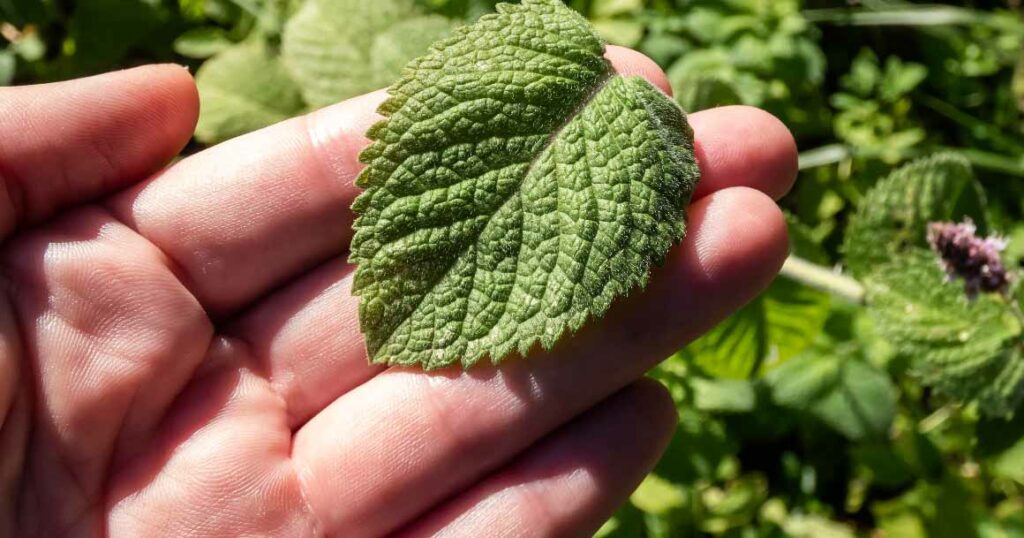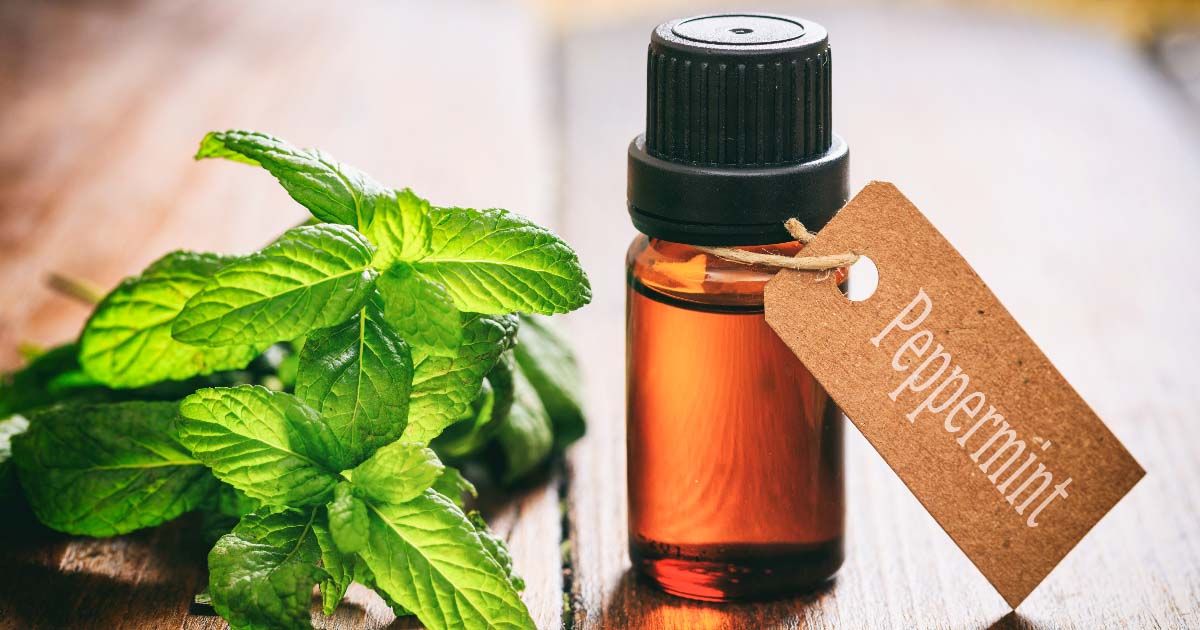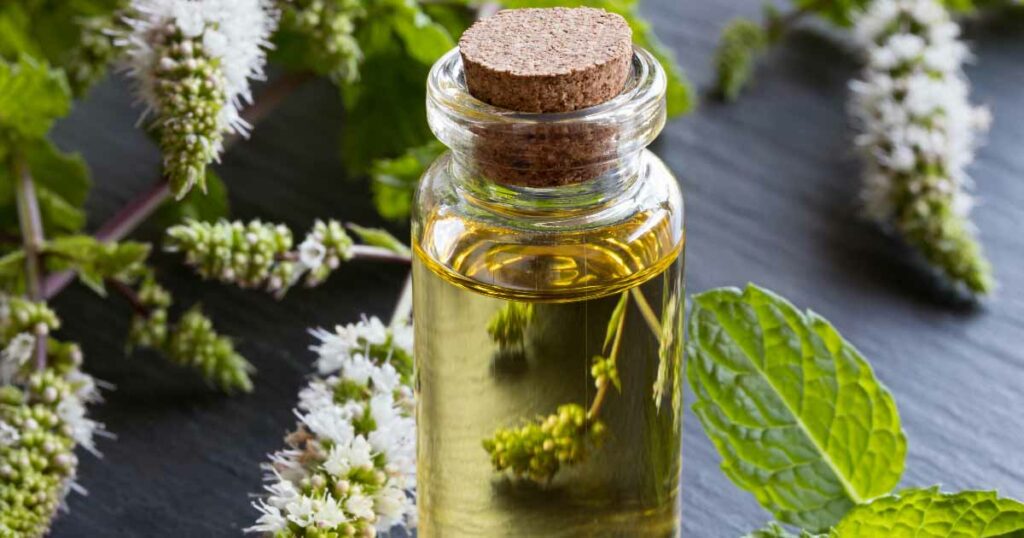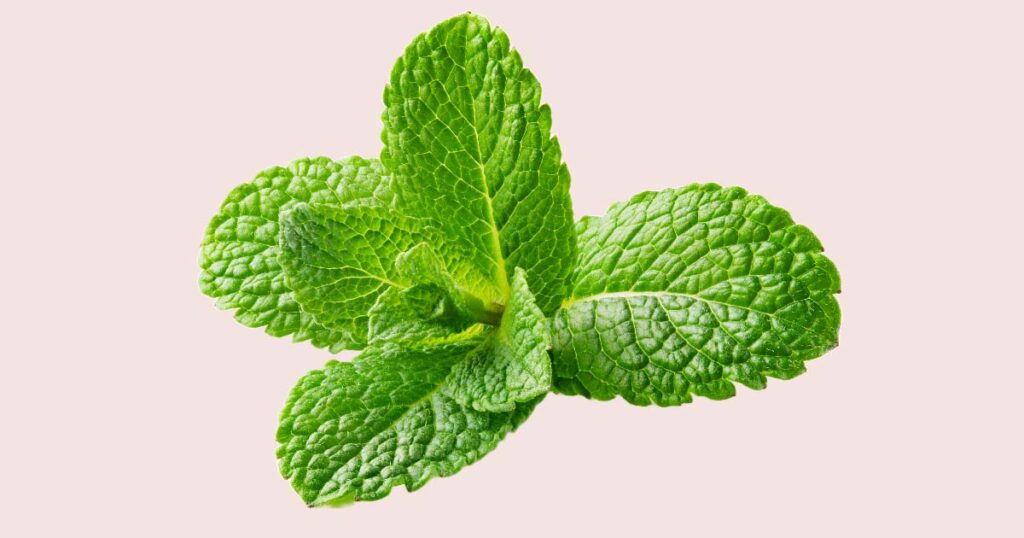I have been using peppermint oil for more than 15 years, and it’s a must-have with me at all times, especially during allergy season with painful sinuses. Read all about it here!
In this article, I will explore peppermint oil’s uses, safety considerations, and potential benefits, helping you understand why it has become such a popular choice among essential oil enthusiasts.
Introduction to Peppermint Oil
Peppermint oil, derived from the peppermint plant (Mentha piperita), is a versatile and popular essential oil with a refreshing and invigorating aroma.
It has been used for centuries in various cultures for its numerous therapeutic properties. The main ingredient in peppermint oil is menthol, which gives it a distinct minty scent and cooling sensation.
Peppermint oil is known for its potential benefits in relieving digestive issues, soothing headaches, promoting mental focus, and providing respiratory support.
Whether used topically, inhaled, or as a flavouring agent, peppermint oil has gained recognition for its natural and holistic approach to wellness.
Ancient Origins
Peppermint oil has a long and fascinating history dating back thousands of years. Its use can be traced back to ancient civilizations, including the Egyptians, Greeks, and Romans, who valued its medicinal properties and invigorating aroma.
The ancient Egyptians were known to cultivate peppermint and use it for various purposes.
They used it in their perfumes, cosmetics, and even in their food and beverages.
Peppermint was highly regarded for its refreshing scent and its ability to promote vitality.
In ancient Greece, peppermint was associated with the god Hades, and it was believed to have healing properties.
The Greeks used peppermint in their baths and as a flavouring for their wines and sauces.
It was also used in traditional medicine to treat digestive issues and respiratory ailments.
While peppermint is not native to the Americas, the indigenous Native American tribes had their own rich traditions of herbal medicine and healing practices, utilizing the plants that were native to their regions.
The Mayas and Aztecs, for example, had a profound knowledge of medicinal plants and herbal remedies.
Although peppermint may not have been part of their traditional healing practices, they used an extensive repertoire of herbs and plants for various medicinal purposes.
Peppermint oil ‘s Journey
During the Roman Empire, peppermint gained further popularity.
The Roman naturalist and philosopher Pliny the Elder mentioned peppermint in his writings, praising its ability to stimulate the mind and soothe the stomach.
Peppermint was commonly used in cooking and for its aromatic and medicinal qualities.
Over time, the use of peppermint spread throughout Europe and the Middle East.
In the 18th century, peppermint began to be cultivated on a larger scale in England and eventually made its way to the United States.
In the 19th century, peppermint oil became widely recognized for its therapeutic properties.
It was used to alleviate digestive issues, such as indigestion and bloating, as well as to relieve headaches and promote mental clarity.
Cultivation in the United States
The history of peppermint oil in America is closely tied to the cultivation and production of peppermint plants, particularly during the 19th and early 20th centuries.
The commercial production of peppermint oil in the United States began in the mid-1800s.
States such as Indiana, Michigan, and Oregon became prominent regions for peppermint cultivation due to their suitable climate and soil conditions.
These areas provided optimal growing conditions for peppermint plants, which thrived in rich, loamy soils.

Farmers recognized the economic potential of cultivating peppermint plants for their oil.
Peppermint plants were propagated through root cuttings, and large fields of peppermint were established. The plants were carefully tended to, with the farmers ensuring proper irrigation, weeding, and pest control to maximize yields.
Peppermint plants typically reach their peak oil content just before flowering, and this is when they are harvested.
The plants were cut and left to dry, and the leaves and flowering tops were then subjected to steam distillation.
This process involved passing steam through the plant material to extract the essential oil, which was then collected and separated from the water.
The production of peppermint oil quickly gained momentum in the United States, and by the late 19th century, American peppermint oil became highly regarded for its quality.
The United States emerged as one of the leading producers of peppermint oil globally, supplying both domestic and international markets.
The Power of Peppermint Oil
Peppermint oil possesses various powerful properties, making it a highly sought-after essential oil. Here are some aspects highlighting the power of peppermint oil:
Refreshing and Invigorating
The aroma of peppermint oil is known for its refreshing and invigorating qualities. Just a whiff of its minty scent can awaken the senses and provide a boost of energy.
Digestive Aid
Peppermint oil has been traditionally used to alleviate digestive issues. It can help relieve symptoms such as indigestion, bloating, and stomach discomfort. Its natural properties can relax the gastrointestinal tract muscles, promoting smoother digestion.
Headache Relief
Peppermint oil is often used to alleviate headaches and migraines. Its cooling and soothing effect can help reduce tension and ease headache symptoms. Applying a diluted solution of peppermint oil to the temples or inhaling its aroma may provide relief.
Mental Focus
The aroma of peppermint oil has been shown to enhance mental clarity and promote focus. Inhaling peppermint oil can stimulate the mind and help improve concentration and cognitive performance. It is a popular choice for study or work environments.
Respiratory Support
Peppermint oil can provide respiratory support and help relieve congestion. Its cooling sensation and ability to open up the airways make it beneficial for those dealing with respiratory issues, such as coughs, colds, sinus congestion, or allergies. Inhaling peppermint oil or using it in a steam inhalation can provide relief.
Natural Insect Repellent
Peppermint oil is known for its ability to repel insects. Its strong scent is disliked by mosquitoes, ants, spiders, and other pests. Diluted peppermint oil can be applied to the skin or used as a room spray to keep insects at bay.
Muscle Soother
Peppermint oil has a cooling effect that can help soothe sore muscles and reduce muscle pain. It is commonly used in massage oils or topical preparations for its analgesic properties. Applying peppermint oil topically can provide a refreshing and comforting sensation to tired or achy muscles.
Natural Breath Freshener
Peppermint oil’s fresh minty flavour makes it a popular choice for freshening breath. It is often found in toothpaste, mouthwashes, and chewing gums due to its ability to leave a cool, clean feeling in the mouth.
peppermint oil Natural Energizer
Peppermint oil’s invigorating scent and stimulating properties make it a natural energizer. Inhaling its aroma or using it in aromatherapy can help combat fatigue, boost mood, and increase alertness.
Versatility
Peppermint oil is highly versatile and can be used in various ways. It can be applied topically, inhaled, ingested (with caution and under proper guidance), or used as a flavouring agent. Its adaptability and wide range of applications contribute to its popularity.
While peppermint oil offers numerous potential benefits, using it responsibly and according to recommended guidelines is important.
As with any essential oil, it’s advisable to dilute peppermint oil before applying it to the skin and to perform a patch test to check for any adverse reactions.
If you have any specific health concerns or conditions, it’s best to consult with a healthcare professional before using peppermint oil.
Soothing Sinus Problems Naturally
Now, let’s talk about sinus, specifically allergy sinus, a condition I suffer from often.
It gives me terrible pain in the forehead, eyebrows, between the eyes, and sometimes under the eyes.
The pain in the forehead is especially intense. Since I discovered peppermint oil, my quality of life has improved significantly, especially during allergy season.
I do not provide medical advice, so always consult your doctor for any health problems. You can try peppermint oil as a natural approach to relieving the pain. Let’s delve into What is Sinus:
Sinus allergies
Also known as allergic rhinitis or hay fever, are a common condition characterized by inflammation of the nasal passages and sinuses in response to allergens.
Here’s a comprehensive overview of sinus allergies and how they relate to hay fever:
What are Sinus Allergies (Allergic Rhinitis)?
Sinus allergies occur when the immune system overreacts to harmless substances, called allergens, such as pollen, dust mites, pet dander, mould spores, or certain foods.
When exposed to these allergens, the immune system releases histamines and other chemicals, triggering inflammation and causing allergy symptoms.
Types of Sinus Allergies
Seasonal Allergic Rhinitis (Hay Fever)
This type of sinus allergy occurs during specific seasons when certain plants release their pollen into the air.
Common triggers include tree pollen in the spring, grass pollen in the summer, and weed pollen in the fall.
Perennial Allergic Rhinitis
Unlike seasonal allergies, perennial allergic rhinitis can occur year-round.
It is usually triggered by allergens that are present indoors, such as dust mites, pet dander, mould, or cockroach droppings.
Symptoms of Sinus Allergies
Sinus allergies can cause a range of symptoms, including:
Sneezing
Runny or stuffy nose
Itchy or watery eyes
Nasal congestion
Sinus pressure or pain
Postnasal drip (mucus dripping down the throat)
Coughing
Fatigue
Reduced sense of smell or taste (less common)
Managing Sinus Allergies:
While there is no cure for sinus allergies, several strategies can help manage and reduce symptoms:
Avoidance
Identify and minimize exposure to allergens. Keep windows closed during peak pollen seasons, use allergen-proof bedding, keep pets out of the bedroom, and maintain clean indoor environments to reduce dust and mould.
Nasal Irrigation
A saline solution or nasal rinse can help flush out allergens and thin mucus, relieving congestion and nasal symptoms.
When to Seek Medical Advice
It is advisable to consult a healthcare professional if
Symptoms significantly affect daily life or sleep quality.
Over-the-counter medications do not provide sufficient relief.
Symptoms persist or worsen despite self-care measures.
Allergy symptoms are accompanied by other concerning symptoms, such as severe facial pain, fever, or worsening asthma symptoms.
Sinus VS Perpemaint Oil
Relieves Congestion
The menthol in peppermint oil has a cooling effect that can help soothe congestion in the nasal passages, providing relief from stuffiness.
Opens Up Airways
Peppermint oil has been found to have a bronchodilator effect, which means it can help relax and open up the airways. This can make breathing easier, especially if you’re dealing with sinus-related breathing difficulties.
Soothes Sinus Pressure
Applying peppermint oil to the areas around your sinuses can provide a cooling and soothing sensation, potentially reducing sinus pressure and discomfort.
I do now have those jade face massage rolls on (the ones with battery) and massage my face with it after applying the peppermint oil. But Most of the time, I use my fingers.
Here are some FAQ About peppermint oil.
How Long Does the Peppermint Oil Smell Last?
One common question regarding peppermint oil is how long its smell lingers.
The duration of the peppermint scent can vary depending on factors such as the concentration of the oil, the application method, and individual body chemistry.
In general, you can expect the aroma of peppermint oil to last for a few hours when applied as a roll-on. However, remember that the scent’s intensity may diminish over time.
Rosemary and Peppermint Oil
While we’re discussing essential oils, it’s worth mentioning rosemary oil.
Rosemary (Rosmarinus officinalis) is another aromatic herb with potential health benefits.
Rosemary (Rosmarinus officinalis) and peppermint oil are both popular essential oils with distinct properties and potential health benefits.
Rosemary oil is derived from the rosemary herb and has an invigorating aroma that is believed to promote mental clarity and concentration.
It contains antioxidant and anti-inflammatory compounds that may support overall well-being. Additionally, rosemary oil is often used in hair care products to promote hair growth and scalp health and for its potential digestive benefits.
On the other hand, peppermint oil is derived from the peppermint plant (Mentha piperita) and has a refreshing and minty aroma.
Inhaling peppermint oil can provide a cooling sensation and promote alertness and mental focus.
It is commonly used for digestive support, helping to alleviate indigestion, bloating, and abdominal discomfort.
Peppermint oil is also known for its respiratory benefits, as it can help clear the airways and ease breathing.
It can be applied topically for its cooling and soothing effects on muscles and skin.
When combined, rosemary and peppermint oil creates a pleasant and invigorating scent.
Many people find the combination to be uplifting and energizing, making it a popular choice in aromatherapy and personal care products.
It’s important to use essential oils safely and properly. If you plan to use rosemary or peppermint oil, it is advisable to consult reputable sources or seek guidance from aromatherapy practitioners or essential oil references to ensure appropriate usage and avoid any potential contraindications.
Individual experiences with essential oils can vary, so it’s always recommended to listen to your body and seek professional advice if needed.
Can Peppermint Oil be Ingested?
Peppermint oil is generally safe for inhalation and topical use when appropriately diluted. However, ingesting peppermint oil is a different matter.
Undiluted peppermint oil is highly concentrated and can be toxic if swallowed.
Ingesting large amounts of peppermint oil can cause adverse effects such as heartburn, nausea, and even liver damage.
Consider caution and consult with a healthcare professional before ingesting any essential oil.
Determining if an essential oil is safe for ingestion requires careful consideration and expert advice. Here are some steps you can take to determine if peppermint oil is ingestible:
Research
Conduct thorough research on reputable sources that provide information on essential oils and their safe usage. Look for information from reliable aromatherapy experts, essential oil organizations, or qualified healthcare professionals.
Consult an Expert
Seek guidance from a certified aromatherapist, herbalist, or healthcare professional who has experience and knowledge in essential oil usage. They can provide personalized advice based on your specific health situation.
Read the Label
Check the label and product information provided by the manufacturer. Some essential oil brands may indicate if their oils are safe for internal use. However, it’s important to remember that labelling alone is not sufficient evidence for determining ingestibility.
Consider Quality
Ensure that you are using high-quality, pure, and therapeutic-grade peppermint oil. Lower-quality oils or those with additives may not be suitable for ingestion.
Be Aware of Precautions
Peppermint oil is generally considered safe for ingestion in small amounts for most healthy adults.
However, there are certain situations where ingestion should be avoided or used with caution, such as during pregnancy, breastfeeding, or if you have certain medical conditions.
Always consult with a healthcare professional to assess your individual circumstances.
Proper Dosage
If you receive guidance from a qualified expert to ingest peppermint oil, following their recommended dosage and usage instructions is crucial. Essential oils are highly concentrated, so even small amounts can have powerful effects.
Potential Interactions
Consider any medications or existing health conditions you may have, as some medications or medical conditions may interact with ingested essential oils. Consulting a healthcare professional is important to ensure safety and avoid potential interactions.
Which Peppermint Oil is Safe?
Choosing a high-quality product from a reputable source is crucial when purchasing peppermint oil.
Look for peppermint oil that is labelled as 100% pure and organic.
This ensures that the oil has been produced without the use of harmful pesticides or additives.
Additionally, consider opting for oils that are third-party tested for quality and purity.
What is Peppermint Oil Good For?
Apart from its potential benefits for sinus problems, peppermint oil has a wide range of uses. It is commonly employed for:
Headache Relief: Peppermint oil’s cooling effect can help alleviate tension headaches and migraines when applied topically to the temples and forehead.
Digestive Support: Peppermint oil has been traditionally used to relieve digestive issues such as indigestion, bloating, and stomach discomfort.
Natural Bug Repellent: The strong scent of peppermint oil can deter insects, making it an effective natural alternative to chemical-based repellents.
Mental Focus and Energy: The invigorating aroma of peppermint oil is believed to enhance mental alertness and boost energy levels.
Remember, while peppermint oil can offer potential benefits, it may not be suitable for everyone. If you have any underlying health conditions or concerns, it’s always best to consult with a healthcare professional before incorporating peppermint oil into your routine.
I’ve discovered the perfect personal fan that will keep you feeling refreshed and comfortable all season long. Review here: Which is the Best Personal Fan for This Summer?
My Conclusion about Peppermint oil
I wanted to talk about my experience with peppermint oil, a game-changer in my life for over 15 years.
This incredible essential oil has become a must-have for me, particularly during allergy season when sinus problems can cause such painful discomfort.
What makes peppermint oil so sought-after? Well, let me tell you, it possesses many powerful properties that have captured the attention of essential oil enthusiasts worldwide.
It can relieve digestive issues, headaches, and sinus congestion, promote mental focus, repel insects, soothe sore muscles, freshen your breath, and act as a natural energizer. Talk about a versatile superstar!
You can use peppermint oil in various ways. Its applications range from topical use to inhalation, ingestion (with caution and proper guidance), and even flavouring.
Now, let’s focus on one area where peppermint oil truly shines for me—natural soothing sinus problems.
During allergy season, sinus allergies, also known as allergic rhinitis or hay fever, can make life quite challenging.
The immune system goes into overdrive, reacting to allergens and causing inflammation in the nasal passages and sinuses. But fear not! Peppermint oil can come to the rescue by providing relief from congestion, opening up those airways, and soothing sinus pressure.
You can apply it topically, inhale its aromatic goodness, or even incorporate it into facial massage techniques.
Before you rush off to try peppermint oil, let me emphasize the importance of using it responsibly and following recommended guidelines.
Diluting the oil before applying it to the skin, conducting a patch test to check for adverse reactions, and consulting a healthcare professional if you have specific health concerns or conditions are crucial steps to ensure safe usage.
We always have to prioritize our well-being!
Peppermint oil offers a natural and holistic approach to soothing sinus problems.
Its rich history, a wide range of potential benefits, and incredible versatility have made it a top choice for those seeking natural remedies.
But remember, my friends; it’s essential to use peppermint oil responsibly, seek professional advice when needed, and always listen to your body’s needs.
With the right knowledge and guidance, peppermint oil can become a valuable addition to your wellness routine.
So go forth, explore the wonders of peppermint oil, and embrace the power of natural remedies.
Visit My Home Page for more Articles!










I have been using peppermint oil in my diffuser and i love it
Thank you for the in-depth blogpost